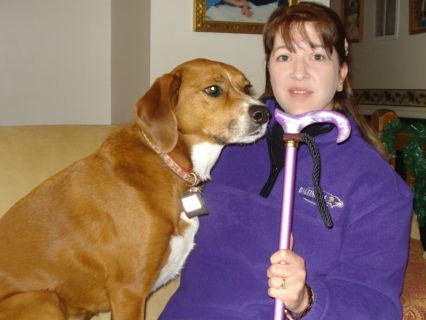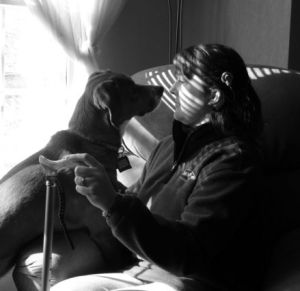The Chicken or the Egg?
What came first, the chicken or the egg? That phrase brings a smile to my face every time I come across it. It has been the cause of many a debate from both my childhood and my present. I suppose I’ve always been surrounded by people who love to argue a point. Everyone knows the chicken came first. If you disagree with that… well, you’ll need to write your own post!
In life there are many cause and effect changes. These are either passionately discussed because of more serious consequences that can occur, or worse – not discussed at all due to what many may view as a “taboo” subject.
I’ve always been a “worrier”. I can remember hearing from my mother at a very young age, “Denise… don’t make mountains out of mole hills”. I was also told that if I didn’t have something to worry about, I’d work hard until I had found something to worry over. As an adult, I prefer to look at my “worryin’ over things” as my way of preparing, planning, and anticipating outcomes. Believe it or not, “worrying” calms me down.
But I am not misguided in believing that worry is the same thing as anxiety. I don’t remember being an anxious kid. “Worrier” – yes, anxious – no. I do know that I have had anxious periods in my life. I have a new “friend” who is a phenomenal writer. I’ve been pushing Lisa to investigate writing a book and hope I have finally twisted her arm in doing so. Having benefited from her wisdom and straight-forward speculations, I’ll be one of the first in line to buy several copies. She has been blogging about “anxiety” quite a bit lately. (If you have had problems with anxiety, I encourage you to begin reading her posts beginning here).
I have met many people with different types of disabilities. I have also met many “anxious” people. Often, those people are “one and the same”. What came first? The disability or the anxiety?
We Can Make Ourselves Sick
One doesn’t have to “google” stress and anxiety very long before they begin to find out these feelings can affect our physical health. Our body’s immune systems can even be weakened when exposed to stress for prolonged periods of time. Although “thinking happy thoughts” does not necessarily cure every ailment, being stressed, worried, anxious and pessimistic can certainly hinder our getting well.
Many physicians who specialize in critical care fields have long been taught how important it is to treat the patient’s mental and emotional state as well as their bodies. Even a patient’s spiritual beliefs can aid in recovery. Discovering (or re-discovering) hope and belief in God, can greatly benefit a patient who has experienced an injury or life-changing illness. My husband wrote his dissertation along these lines. His book is NOT easy reading – smile. Effects of Religiosity on Life Satisfaction Among Survivors of Brain Injury, was written after having seen the direct results of faith on patients with a TBI over a number of years. Terry researched whether or not people with brain injury have higher life satisfaction if they are involved in religious practices. People with brain injury traditionally have one of the lowest life satisfaction scores of any population. They have similar scores to people in prison! In contrast, if someone with a TBI has no faith – no belief system, they tend to have very low expectations and life satisfaction.
Disability or Anxiety?
So… which came first? Anxiety can certainly be triggered by “life events”, but it can also be a chemical imbalance in an individual. Anxiety disorders are serious. Feeling anxiety – an “anxiousness” – from time to time is not uncommon and even expected in this thing we live called LIFE. Can a disability, especially an acquired disability, cause us to feel anxious? Can that anxiety, ignored and untreated, lead to a disorder? Yes… and yes. However, one can have a disability and learn to “cope”. Learning to cope, and developing new interests, skills and networks, makes a disability more of a discovery! One learns how to acquire new ABILITIES.
Being disabled does not mean one is not “able”. Certainly being deaf and having Meniere’s disease, places me in a disability group, or category. I don’t consider myself disabled as long as I work hard at being “able”. A cochlear implant, support group, a service dog and advocating in a positive way, have allowed me to create a way to cope… to live in a normal way. I’m living a “new normal”. These activities keep me from feeling anxious.
Does that mean I never worry? Heck no! But worrying is not anxiety. If I begin to see a set pattern of anxiousness, I treat that very seriously. Why am I anxious? Has something triggered it? Am I eating right, sleeping well, and taking care of myself? However, WORRY is different than anxiety. I have plenty of daily worries that actually allow me to process things and plan my day.
Am I worried when I stand at the top of a stairwell with Chloe in heel, people milling all around me, and the room spinning counter-clockwise as I desperately try to adjust my eyes to the depth of the stairs below? Well YES! But that worry has allowed me to take steps (pardon the pun) in making it possible for me to traverse stairs safely. Chloe acts as a counter-balance, I instruct students around me that I’m not listening or talking until I get to the bottom… so don’t bother me, I breathe evenly and fix my eyes on no more than two steps at a time, and before I know it… I’m kissing the floor in relief at the bottom! (OK, that’s an exaggeration, but I certainly do feel euphoric!)
Do I feel anxious when my cochlear implant batteries go dead? (DUH) Of course I do! But my worrying about it happening at an inopportune moment, has led to a very real plan of action. I have batteries EVERYWHERE. They are in Chloe’s working vest, my pocketbook, the van, at home, and in my office. My CI is set up to give me a 20 minute warning beep. When I hear it, I continue with what I’m doing but I include a few moments to secure new batteries. I’m an expert at slipping out the battery compartment, punching out the three #675 batteries, and replacing them with finesse and speed. I’m never “deaf” for very long.
I plan in advance to get 8 to 10 hours of sleep each night. (Yes, you read that right). My sleeping a great deal is not a warning sign that I am depressed. I plan to sleep 8 to 10 hours a night! I make it a priority, and I’m often the first Portis in bed each night. I get a great deal of sleep because I’ve discovered that I “hear better” when I do. It takes a lot out of a person to hear through a cochlear implant. Lip reading is not easy. Making sense of the noise in my world takes concentration. I need sleep to function well.
Because of my Meniere’s disease, I consume less salt and caffeine. I take Manganese and working hard at trying to exercise regularly. (My sister and I have a New Year’s challenge to each other to do better at this!)
At the beginning of this school year, I worried like crazy about some of the things I’m required to go to as a teacher that are at night. Meniere’s has made driving at night difficult, as headlights from oncoming traffic trigger vertigo and make it difficult to see. The light acts as a “beacon” if you will, and my eyes are drawn to the counter-clockwise beams around me instead of the road ahead. I worried about how to tell my director that I couldn’t do things at night. But that “worrying” allowed me to plan how I would present my reasons and requests. She listened, and approved my request to not attend meetings after dark.

To some people, all the things I do each day to be safe, hear well, and live a full and productive life may seem tedious and strange. But these things are “my normal”. These plans and daily preparations are not tedious and strange for ME. Santa Kyersten (my daughter) gave me a cane for Christmas. It was something on my wish list and for me, a necessary tool to live “my normal” on rainy days when my Meniere’s disease makes my balance much worse.
Disability, not Inability
Being disabled means one must find a way to do the things you want to do in a new way. My deaf/blind friends enjoy communicating with friends and relatives by utilizing both cochlear implants and JAWS (a screen reader program for those with visual challenges and impairments). My friends who have mobility challenges, use service dogs, walkers, canes or power scooters. Late-deafened people learn to speech read, use hearing aids, cochlear implants and assistive listening devices. I have chosen to have a partner to help of the canine variety! Chloe gives me independence and confidence.
I’m not trying to suggest that there are not things that every disability group are simply not able to do. I’m deaf. I’m not able to have a job that relies heavily on communication by phone. There are jobs I could never do that require being able to hear well. I’m afraid I’ll never be an Air Traffic Controller! However, the most empowering thing an individual with a disability can do is learn what they CAN do. We live in a wonderful day of technology and gadgets. I can do many things that I would not have been able to do had I become deaf even 20 years ago. When new people come to our local hearing loss support group, we work hard at helping them find ways to continue doing what they want to do at both work and home. There are times an impasse is reached, and we encourage finding NEW things that bring just as much joy and satisfaction as a past job or hobby.
One is only truly no longer “able”, when they give up and resign themselves to isolation and feelings of worthlessness. Yes… there are things I can no longer do that I once enjoyed. But people who cared “booted me in the backside” and encouraged me to find new things I could do! I have a disability, but I live a rich and full life. I feel productive and satisfied with my life.
I’m sure that being a person of faith, has made this transition to a “new normal” easier for me. My life can change, and my abilities may “morph”. God never changes, nor deviates from being my Anchor that HOLDS. The reality is… HE came “first“, and I work hard at keeping Him there in my life.
Denise Portis
© 2009 Hearing Loss Journal


Denise,
I LOVE this post! You have articulated so many things that are on my heart as a person with hearing loss. The worries about the future, about holding and keeping a job, about personal safety … I, too, have let my mind fill with these thoughts.
But I like how you emphasize God never changing. Even when our lives change because of hearing loss (sometimes daily), God is our ever-present rock. He is unmovable, steadfast, solid. And the best part is, God is in control even in our chaos.
Keep writing and sharing. I value your perspective!
Blessings,
Shanna
my turn to say Amen and Amen! Ya nailed it! Goodness I love reading your posts…I check every day or two for new ones.
Oh, the book is about halfway written, BTW, thanks to your encouragement. God bless,
–Lisa